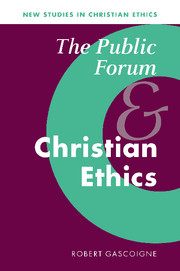Book contents
- Frontmatter
- Contents
- General editor's preface
- Acknowledgements
- Introduction
- 1 Revelation and reason in liberal societies
- 2 Revelation and a contemporary public ethics
- 3 The theology of revelation and Christian identity
- 4 The communication of Christian ethics in the public forum
- 5 Reconciling autonomy and community
- Select bibliography
- Index
5 - Reconciling autonomy and community
Published online by Cambridge University Press: 22 August 2009
- Frontmatter
- Contents
- General editor's preface
- Acknowledgements
- Introduction
- 1 Revelation and reason in liberal societies
- 2 Revelation and a contemporary public ethics
- 3 The theology of revelation and Christian identity
- 4 The communication of Christian ethics in the public forum
- 5 Reconciling autonomy and community
- Select bibliography
- Index
Summary
The previous chapter was devoted to a general interpretation of the task of Christian ethical communication, in the light of the argument of this book as a whole. The purpose of this final chapter is to demonstrate the meaning and intention of this general interpretation by focussing – in a more concretely sociological context – on an ethical issue central to the concerns of this book, namely, the relationship between autonomy and ethical community. The importance of this issue was highlighted in chapter 1, in terms of the challenge facing liberal societies in reconciling the value of autonomy with ethical perspectives which could situate the worth of persons within community. This reconciliation of autonomy and community is at the heart of any communication of the Christian ethical vision – and its scope and meaning are urgently contested in normative debate.
The focus of disagreement in this normative debate is on the tension between conceptions of autonomy and of obligations to community. It is here that the liberal understanding of the public forum, and understandings which are informed by various traditions of the good, are in most direct conflict. It is important to note, however, that the source of the conflict is not in the importance that the liberal tradition gives to individual rights. The value of the individual is a truth that both liberal secular and Christian conceptions rightly cherish as fundamental to a humane polity.
- Type
- Chapter
- Information
- The Public Forum and Christian Ethics , pp. 212 - 235Publisher: Cambridge University PressPrint publication year: 2000

